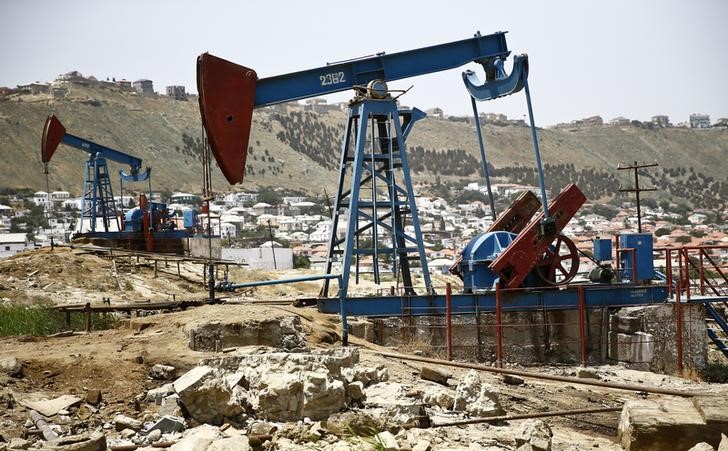(Adds quote, details, background)
By Allison Lampert
MONTREAL, April 7 (Reuters) - Quebec's Liberal government
said on Thursday it was aiming to cut the province's use of
petroleum products by 40 percent by 2030 and would invest C$4
billion (3.04 billion) to pursue that strategy.
Renewable energy now supplies about 47 percent of Quebec's
needs, an amount the province intends to boost to 61 percent by
2030, as part of five targets to reduce its dependence on fossil
fuels, Energy Minister Pierre Arcand told reporters in Montreal.
Along with greater use of hydroelectric energy, Canada's
second-most populous province would boost its consumption of
natural gas to offset oil, both through imports and by
encouraging local production.
The province said it would also put an end to its already
limited usage of coal.
"What we are proposing to Quebecers is a new energy pact,"
Arcand said.
Arcand said the energy project would be introduced as a bill
in Quebec's provincial parliament, where the Liberals have a
majority, by the end of the session in June. It could be
approved into law by the end of the year.
Quebec, the fourth largest hydroelectric producer in the
world, pledged in 2015 to reduce its greenhouse gas emissions by
37.5 percent by 2030. It is part of a cap-and-trade system with
Ontario, Manitoba and California.
Quebec Environment Minister David Heurtel called the
greenhouse gas emissions target the most "ambitious in Canada
and one of the most ambitious in the world."
The province has set additional targets of boosting its
production of renewable energy by 25 percent and bioenergy by 50
percent. Quebec also wants to improve its energy efficiency by
15 percent.
Arcand said it did not appear that Quebec's new policy, with
its goal of reducing oil usage, would have an impact on the
province's evaluation of TransCanada Corp's TRP.TO proposed
Energy East pipeline. On March 1, Quebec asked for a court
injunction to ensure the Energy East pipeline complied with the
province's environmental laws.
"We have the objective of reducing greenhouse gases," Arcand
said. "The TransCanada project transports oil that will use
electric pumping stations. There are some greenhouse gas
emissions, but will the emissions be significant - I can't say."
- English (USA)
- English (UK)
- English (India)
- English (Australia)
- English (South Africa)
- English (Philippines)
- English (Nigeria)
- Deutsch
- Español (España)
- Español (México)
- Français
- Italiano
- Nederlands
- Português (Portugal)
- Polski
- Português (Brasil)
- Русский
- Türkçe
- العربية
- Ελληνικά
- Svenska
- Suomi
- עברית
- 日本語
- 한국어
- 简体中文
- 繁體中文
- Bahasa Indonesia
- Bahasa Melayu
- ไทย
- Tiếng Việt
- हिंदी
UPDATE 2-Quebec aims to reduce oil consumption 40 pct by 2030
Published 2016-04-07, 05:37 p/m
UPDATE 2-Quebec aims to reduce oil consumption 40 pct by 2030

Latest comments
Install Our App
Risk Disclosure: Trading in financial instruments and/or cryptocurrencies involves high risks including the risk of losing some, or all, of your investment amount, and may not be suitable for all investors. Prices of cryptocurrencies are extremely volatile and may be affected by external factors such as financial, regulatory or political events. Trading on margin increases the financial risks.
Before deciding to trade in financial instrument or cryptocurrencies you should be fully informed of the risks and costs associated with trading the financial markets, carefully consider your investment objectives, level of experience, and risk appetite, and seek professional advice where needed.
Fusion Media would like to remind you that the data contained in this website is not necessarily real-time nor accurate. The data and prices on the website are not necessarily provided by any market or exchange, but may be provided by market makers, and so prices may not be accurate and may differ from the actual price at any given market, meaning prices are indicative and not appropriate for trading purposes. Fusion Media and any provider of the data contained in this website will not accept liability for any loss or damage as a result of your trading, or your reliance on the information contained within this website.
It is prohibited to use, store, reproduce, display, modify, transmit or distribute the data contained in this website without the explicit prior written permission of Fusion Media and/or the data provider. All intellectual property rights are reserved by the providers and/or the exchange providing the data contained in this website.
Fusion Media may be compensated by the advertisers that appear on the website, based on your interaction with the advertisements or advertisers.
Before deciding to trade in financial instrument or cryptocurrencies you should be fully informed of the risks and costs associated with trading the financial markets, carefully consider your investment objectives, level of experience, and risk appetite, and seek professional advice where needed.
Fusion Media would like to remind you that the data contained in this website is not necessarily real-time nor accurate. The data and prices on the website are not necessarily provided by any market or exchange, but may be provided by market makers, and so prices may not be accurate and may differ from the actual price at any given market, meaning prices are indicative and not appropriate for trading purposes. Fusion Media and any provider of the data contained in this website will not accept liability for any loss or damage as a result of your trading, or your reliance on the information contained within this website.
It is prohibited to use, store, reproduce, display, modify, transmit or distribute the data contained in this website without the explicit prior written permission of Fusion Media and/or the data provider. All intellectual property rights are reserved by the providers and/or the exchange providing the data contained in this website.
Fusion Media may be compensated by the advertisers that appear on the website, based on your interaction with the advertisements or advertisers.
© 2007-2025 - Fusion Media Limited. All Rights Reserved.